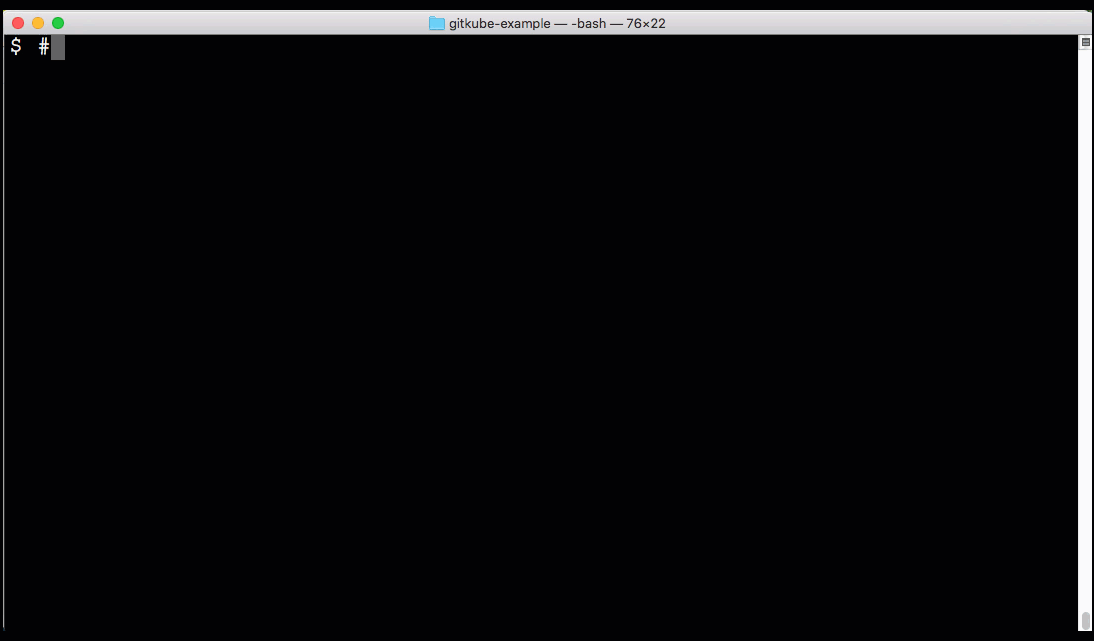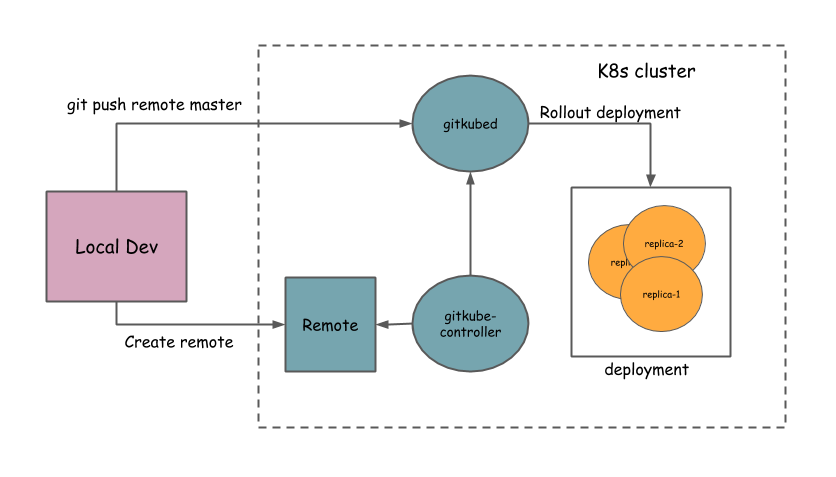

GitHub - hasura/gitkube: Gitkube: Build and deploy docker images to Kubernetes u...
source link: https://github.com/hasura/gitkube
Go to the source link to view the article. You can view the picture content, updated content and better typesetting reading experience. If the link is broken, please click the button below to view the snapshot at that time.
README.md
Gitkube
Gitkube is a tool for building and deploying docker images on Kubernetes using git push.
After a simple initial setup, users can simply keep git push-ing their repos to build and deploy to Kubernetes automatically.
When should I use gitkube?
- Ideal for development where you can push your WIP branch to the cluster to test.
- Reference implementation for writing git-based automation on your server. Fork this repo and create your own CRD + controller + git remote hook that can do things on the Kubernetes cluster.
Getting started
Install gitkube
$ kubectl create -f https://raw.githubusercontent.com/hasura/gitkube/master/manifests/gitkube-setup.yaml
$ #expose gitkubed service
$ kubectl --namespace kube-system expose deployment gitkubed --type=LoadBalancer --name=gitkubedFollow this example repo for a typical workflow of gitkube.
How it works
Gitkube has three components:
- Remote: Custom resource defined by a K8s CRD
- gitkube-controller: Controller that manages Remote objects and propogates changes to gitkubed
- gitkubed: Git host that builds docker image from repo and rolls out deployment
High level architecture
Workflow
- Local dev: User creates a base git repo for the application with Dockerfile and K8s deployment
- Setting Remote: User defined the spec for Remote containaing the rules for
git push - Deploying application: Once a Remote is setup, application can be deployed to K8s using
git push <remote> master
Local dev
User should have a git repo with source code and a Dockerfile. User should also create a base K8s deployment for the application.
Setting Remote
A Remote resource consists of 3 parts:
- authorizedKeys: List of ssh-keys for authorizing
git push. - registry: Details of docker registry where images are pushed post-build.
- deployments: Spec for building docker image and updating corresponding K8s deployment.
Here is a typical spec for a Remote:
apiVersion: gitkube.sh/v1alpha1 kind: Remote metadata: name: sampleremote namespace: default spec: # Insert ssh-keys for allowing users to git push authorizedKeys: - "ssh-rsa your-ssh-public-key" # Provide registry details for pushing and pulling image from/into the cluster registry: url: "registry.io/user" credentials: # dockercfg secret secretKeyRef: name: regsecret key: .dockercfg # Define deployment rules deployments: - name: www # Name of K8s deployment which is updated on git push containers: - name: www # Name of container in the deployment which is built during git push path: example/www # Location of source code in the git repo dockerfile: example/www/Dockerfile # Location of Dockerfile for the source code
Deploying application
Once a Remote is created, it gets a git remote url which you can find in its status spec
$ kubectl get remote sampleremote -o yaml ... status: remoteUrl: ssh://[email protected]/~/git/default-sampleremote remoteUrlDesc: ""
Add the generated remoteUrl in git
$ git add remote sampleremote ssh://[email protected]/~/git/default-sampleremote
And finally, git push
$ git push sampleremote master
Roadmap
Gitkube is open to evolution. Some of the features to be added in future include:
- Allowing all apps (daemonset, statefulset) to be deployed using
git push. Current support is limited to deployments. #19 - Allowing different git hooks to be integrated #20
Contributing
Gitkube is an open source project licensed under Apache License 2.0
Contributions are welcome.
Recommend
About Joyk
Aggregate valuable and interesting links.
Joyk means Joy of geeK

